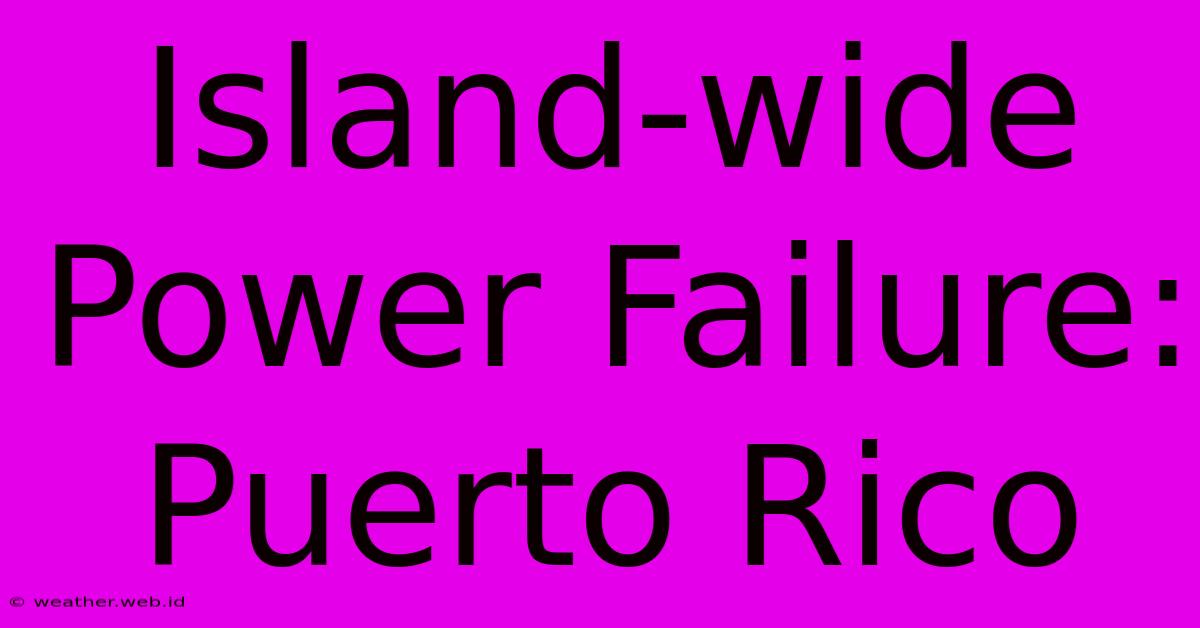Island-wide Power Failure: Puerto Rico

Discover more detailed and exciting information on our website. Click the link below to start your adventure: Visit Best Website weather.web.id. Don't miss out!
Table of Contents
Island-wide Power Failure: Puerto Rico - A Recurring Crisis
Puerto Rico's struggle with reliable electricity is a long and complex story, marked by devastating hurricanes, aging infrastructure, and ongoing political and economic challenges. Island-wide power failures are, sadly, not uncommon, leaving residents, businesses, and vital services in the dark. This article delves into the causes, consequences, and ongoing efforts to address this critical issue.
The Root Causes of Puerto Rico's Power Problems
Several intertwined factors contribute to the frequent power outages across Puerto Rico:
1. Aging Infrastructure: A Crumbling Grid
Decades of neglect have left Puerto Rico's electrical grid in a state of disrepair. The infrastructure is outdated, inefficient, and vulnerable to damage from natural disasters. Lack of consistent maintenance and investment has exacerbated the problem, leading to frequent breakdowns and prolonged outages. This aging system struggles to cope with even minor weather events.
2. Hurricane Devastation: A Recurring Blow
Hurricanes Irma and Maria in 2017 delivered catastrophic blows to the island's power grid. The damage was widespread and extensive, leaving the entire island without power for months. While significant progress has been made in rebuilding, the grid remains vulnerable and susceptible to further damage from future storms. The impact of these hurricanes highlighted the fragility of the existing system and the urgent need for modernization.
3. Political and Economic Challenges: A Complex Web
Puerto Rico's complex political and economic situation further complicates the issue. The island's public power utility, PREPA (Puerto Rico Electric Power Authority), has faced significant financial difficulties, hindering its ability to invest in infrastructure improvements and maintain the existing grid. Bureaucracy and corruption have also played a role in delaying necessary repairs and upgrades. The financial constraints directly impact the availability of resources for effective grid maintenance and modernization.
4. Lack of Diversification: Reliance on Fossil Fuels
Puerto Rico's heavy reliance on fossil fuels for power generation makes the system more vulnerable to price fluctuations and supply chain disruptions. A lack of investment in renewable energy sources limits the island's resilience and ability to diversify its energy portfolio. This over-reliance on a single energy source creates a major vulnerability for the entire island.
The Consequences of Power Outages
The consequences of frequent and prolonged power outages in Puerto Rico are far-reaching:
1. Economic Disruption: A Stifling Impact
Businesses suffer significant losses due to interrupted operations and spoiled goods. Tourism, a key sector of the Puerto Rican economy, is also severely impacted, leading to job losses and reduced revenue. The lack of reliable power discourages investment and hinders economic growth.
2. Public Health Risks: A Serious Threat
Hospitals and medical facilities rely on electricity for life-saving equipment. Power outages endanger patients and disrupt essential medical services. Lack of refrigeration for medication and vaccines also poses a significant public health risk.
3. Social Disruption: Impacts on Daily Life
Power outages disrupt daily life, affecting access to water, communication, and essential services. Residents face challenges with cooking, refrigeration, and staying connected with the outside world. This disruption can lead to social unrest and further strain on already fragile communities.
The Path Forward: Modernization and Resilience
Addressing Puerto Rico's power crisis requires a multi-pronged approach:
1. Modernizing the Grid: Investing in Infrastructure
Significant investment is needed to modernize the aging grid, replacing outdated equipment and improving its resilience to natural disasters. This includes strengthening transmission lines and implementing smart grid technologies to improve efficiency and reliability.
2. Transitioning to Renewable Energy: A Sustainable Future
Investing in renewable energy sources, such as solar and wind power, will diversify the island's energy portfolio and reduce its dependence on fossil fuels. This will enhance energy security and reduce the environmental impact of power generation.
3. Strengthening Governance and Transparency: Accountability and Efficiency
Improving governance and transparency within PREPA and other relevant agencies is crucial to ensure efficient use of funds and effective implementation of infrastructure projects. Combating corruption and improving accountability will be essential for long-term success.
4. Community Resilience and Preparedness: Empowering Communities
Empowering communities through education and preparedness programs will help them better cope with power outages and mitigate the impact on their daily lives. This includes promoting energy conservation and supporting the development of microgrids in vulnerable areas.
The struggle for reliable electricity in Puerto Rico is a multifaceted challenge requiring a sustained and comprehensive effort. Only through a combination of infrastructure investment, energy diversification, improved governance, and community resilience can the island hope to overcome this recurring crisis and build a more secure and sustainable energy future.

Thank you for visiting our website wich cover about Island-wide Power Failure: Puerto Rico. We hope the information provided has been useful to you. Feel free to contact us if you have any questions or need further assistance. See you next time and dont miss to bookmark.
Featured Posts
-
First 2025 Polar Vortex Expect Frigid Temps
Jan 01, 2025
-
2025 Polar Vortex Dangerously Frosty
Jan 01, 2025
-
Widespread Outages Hit Puerto Rico
Jan 01, 2025
-
Three Stars For Michigan State And Wisconsin
Jan 01, 2025
-
Sun Bowl Football Louisville Vs Washington
Jan 01, 2025
